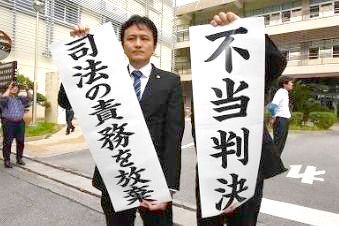Victims of the Battle of Okinawa to take their case to Japan’s Supreme Court after Japan found not liable in reparation lawsuit

Representatives of the plaintiffs holding banners in protest of the decision. November 30, 2017 Fukuoka High Court Naha District
December 1, 2017 Ryukyu Shimpo
The Naha branch of the Fukuoka High Court handed down an appeal decision on November 30 for the “Battle of Okinawa Victim’s State Reparations Suit,” wherein a group of 66 victims and victim’s survivors are demanding an indemnity of 11 million yen per person and an apology for damage suffered during the aforementioned battle.
Chief Justice Toshiro Tamiya recognized Japanese soldier’s injurious behavior as well as wartime damage suffered by the plaintiffs such as post-traumatic stress disorder (PTSD), however he supported the decision of the Naha District Court that originally dismissed the suit which stated that based on Japan’s laws during the war, “Japan was not liable to pay reparations for exercising public authority,” and rejected the victim’s appeal. The citizens plan to appeal the decision to the Supreme Court.
In his ruling, Chief Justice Tamiya said of the damage caused by the Battle of Okinawa that, “The organized suicides by force under military rule is unique,” however he decided that all Japanese people suffered during the war, stating “the unique circumstances of the Battle of Okinawa does not constitute the grounds for demanding compensation and an apology.”
Meanwhile, the judge referenced the damage suffered by two of the plaintiffs, noting that, “it points to the existence of injurious behavior and forced suicides,” by the Japanese Imperial Army. Also, the PTSD suffered by many of the victims originate from the Battle of Okinawa and is suffered by man was recognized in this trial where it was not in the initial ruling.
However, the court ruled that there was an “absence of State liability,” as Japan was deemed not responsible for losses suffered before the enforcement of the “Act concerning State Liability for Compensation,” and therefore the responsibility for the damage suffered by the two plaintiff resided, “only with the soldiers as individuals.”
Regarding damage compensation, the plaintiffs’ allegations that, “we are trying to prevent an absurd situation where there is complete lack of compensation under the survivor support law,” and “the compensation system for private citizens is unequal,” went un-recognized.
Lead lawyer for the victims, Shigeru Zukeyama, said, “The absurdity of rejecting our claim while acknowledging extensive damage is an unjust decision.”
(English translation by T&CT and Sam Grieb)
Previous Article:Fresh Fish to be exported to China
Next Article:Okisho HS enters an agreement with four U.S. universities
[Similar Articles]
- Naha District Court rules Japanese government not liable for war acts committed under the Meiji constitution
- War orphan stresses uniqueness of Battle of Okinawa at appeal court demanding apology and compensation from government
- War victims in South Sea Islands file lawsuit against government
- Futenma noise pollution lawsuit monetary award lowered over 30% in appeal ruling
- Futenma roar appeal dismissed by Supreme Court without issuing a flight ban
 Webcam(Kokusai Street)
Webcam(Kokusai Street)


